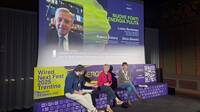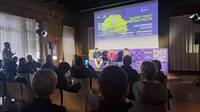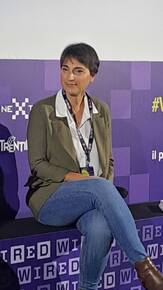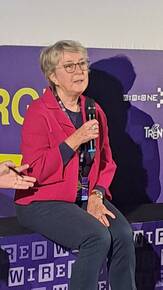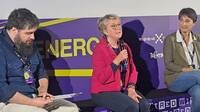PRESS RELEASE
Opportunities and challenges related to the development of new renewable energy sources and carriers — particularly biomass and green hydrogen — with a focus on transparency, traceability and sustainability, were at the centre of this morning’s event organised by the Fondazione Edmund Mach at Palazzo del Bene in Rovereto, as part of the Wired Next Fest 2025.
The talk, titled “New Sources of Clean Energy” and moderated by Wired journalist Riccardo Saporiti, featured Professor Franco Cotana, lecturer at the Università di Perugia, CEO of RSE and member of the FEM Scientific Committee, Silvia Silvestri, Head of the Bioeconomy Research Unit at Fondazione Mach, and Luana Bontempo, Head of the Traceability Research Unit at FEM.
Professor Cotana opened the discussion with an overview of the potential and outlook of renewable energy technologies, drawing on his long-standing experience in applied research on energy and biomass.
Silvestri presented innovative approaches to valorising agricultural by-products and agro-industrial residues as renewable energy resources.
Bontempo focused on the traceability and authentication of green hydrogen, illustrating the recently launched HYTRA project, funded by the Ministero dell’Ambiente e della Sicurezza Energetica.
In a context where hydrogen is increasingly recognised as a strategic energy carrier for decarbonisation, there is still no shared scientific method to objectively certify its origin.
“Green hydrogen is a promising energy carrier, but reliable tools to verify its provenance are still lacking,” explained Bontempo. “With HYTRA, we are working to apply to the energy sector analytical techniques already successfully tested in agri-food, such as isotopic analysis, to provide the market with a credible system for traceability and greater confidence in energy choices.”
“The production of green hydrogen from organic waste and residues,” added Silvestri, “remains a research frontier to be explored — from production technologies and plant scale to safety aspects related to transport, storage and use, and to the traceability of hydrogen derived from renewable sources.”
Cotana highlighted that while technological development for green hydrogen production has begun, achieving European targets will still take time. The event offered the public an opportunity to reflect on research, innovation and the real challenges of the energy transition — not merely a showcase of technologies, but a dialogue on integrating new energy sources into the system with transparency, sustainability and community involvement at its core.
The WIRED Next Fest is organised by WIRED Italia in partnership with the Provincia autonoma di Trento – Assessorato allo sviluppo economico, lavoro, famiglia, università e ricerca, Trentino Marketing, Trentino Sviluppo, Azienda per il Turismo Rovereto, Vallagarina e Monte Baldo, and the Comune di Rovereto.
The programme is developed by a Scientific Committee chaired by the Director of WIRED Italia, with the participation of the Università degli Studi di Trento, Fondazione Bruno Kessler, Fondazione Edmund Mach, Fondazione Hub Innovazione Trentino, Istituto provinciale per la ricerca e la sperimentazione educativa (IPRASE), and the MUSE – Museo delle Scienze.

